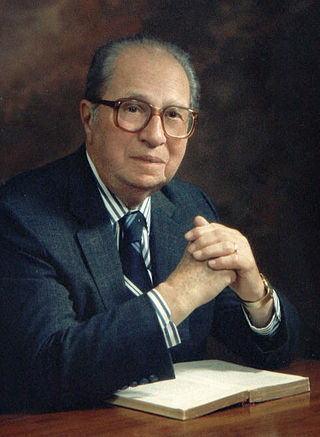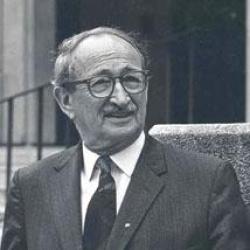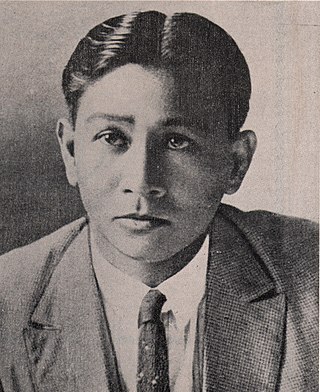Related Research Articles

Mortimer Jerome Adler was an American philosopher, educator, encyclopedist, and popular author. As a philosopher he worked within the Aristotelian and Thomistic traditions. He taught at Columbia University and the University of Chicago, served as chairman of the Encyclopædia Britannica board of editors, and founded the Institute for Philosophical Research.

The Twenty-second Amendment to the United States Constitution limits the number of times a person is eligible for election to the office of President of the United States to two, and sets additional eligibility conditions for presidents who succeed to the unexpired terms of their predecessors. Congress approved the Twenty-second Amendment on March 21, 1947, and submitted it to the state legislatures for ratification. That process was completed on February 27, 1951, when the requisite 36 of the 48 states had ratified the amendment, and its provisions came into force on that date.

Charles Lincoln Van Doren was an American writer and editor who was involved in a television quiz show scandal in the 1950s. In 1959 he testified before the U.S. Congress that he had been given the correct answers by the producers of the NBC quiz show Twenty-One. Terminated by NBC, he joined Encyclopædia Britannica, Inc. in 1959, becoming a vice-president and writing and editing many books before retiring in 1982.

Arthur Hendrick Vandenberg Sr. was an American politician who served as a United States senator from Michigan from 1928 to 1951. A member of the Republican Party, he participated in the creation of the United Nations. He is best known for leading the Republican Party from a foreign policy of isolationism to one of internationalism, and supporting the Cold War, the Truman Doctrine, the Marshall Plan, and NATO. He served as president pro tempore of the United States Senate from 1947 to 1949.

Robert Maynard Hutchins was an American educational philosopher. He was president (1929–1945) and chancellor (1945–1951) of the University of Chicago, and earlier dean of Yale Law School (1927–1929). His first wife was the novelist Maude Hutchins. Although his father and grandfather were both Presbyterian ministers, Hutchins became one of the most influential members of the school of secular perennialism.
Elisabeth Veronika Mann Borgese, was an internationally recognized expert on maritime law and policy and the protection of the environment. Called "the mother of the oceans", she received the Order of Canada and awards from the governments of Austria, China, Colombia, Germany, the United Nations and the World Conservation Union.

William Burnett Benton was an American senator from Connecticut (1949–1953) and publisher of the Encyclopædia Britannica (1943–1973).

Great Books of the Western World is a series of books originally published in the United States in 1952, by Encyclopædia Britannica, Inc., to present the great books in 54 volumes.

The Federation of Australia was the process by which the six separate British self-governing colonies of Queensland, New South Wales, Victoria, Tasmania, South Australia, and Western Australia agreed to unite and form the Commonwealth of Australia, establishing a system of federalism in Australia. The colonies of Fiji and New Zealand were originally part of this process, but they decided not to join the federation. Following federation, the six colonies that united to form the Commonwealth of Australia as states kept the systems of government that they had developed as separate colonies, but they also agreed to have a federal government that was responsible for matters concerning the whole nation. When the Constitution of Australia came into force, on 1 January 1901, the colonies collectively became states of the Commonwealth of Australia.

Sidney Hook was an American philosopher of pragmatism known for his contributions to the philosophy of history, the philosophy of education, political theory, and ethics. After embracing communism in his youth, Hook was later known for his criticisms of totalitarianism, both fascism and Marxism–Leninism. A social democrat, Hook sometimes cooperated with conservatives, particularly in opposing Marxism–Leninism. After World War II, he argued that members of such groups as the Communist Party USA and Leninists like democratic centralists could ethically be barred from holding the offices of public trust because they called for the violent overthrow of democratic governments.
A Syntopicon: An Index to The Great Ideas is a two-volume index, published as volumes 2 and 3 of Encyclopædia Britannica, Inc.’s collection Great Books of the Western World. Compiled by Mortimer J. Adler, an American philosopher, under the guidance of Robert Hutchins, president of the University of Chicago, the volumes were billed as a collection and guide to the most important ideas, clustered under 102 "Great Ideas", of the Western canon. The term “syntopicon” as well as "Great Ideas" were coined specifically for this undertaking, the former a Neo-latin word meaning “a collection of topics.” The volumes catalogued what Adler and his team deemed to be the fundamental ideas contained in the works of the Great Books of the Western World, which stretched chronologically from Homer to Freud. The Syntopicon lists, under each idea, where every occurrence of the concept can be located in the collection's famous works. The Syntopicon was revised as part of the second edition of the collection.
The Great Conversation is the ongoing process of writers and thinkers referencing, building on, and refining the work of their predecessors. This process is characterized by writers in the Western canon making comparisons and allusions to the works of earlier writers and thinkers. As such it is a name used in the promotion of the Great Books of the Western World published by Encyclopædia Britannica Inc. in 1952. It is also the title of (i) the first volume of the first edition of this set of books, written by the educational theorist Robert Maynard Hutchins, and (ii) an accessory volume to the second edition (1990), written by the philosopher Mortimer J. Adler.
Scott Buchanan was an American philosopher, educator, and foundation consultant. He is best known as the founder of the Great Books program at St. John's College, at Annapolis, Maryland.
Richard McKeon was an American philosopher and longtime professor at the University of Chicago. His ideas formed the basis for the UN's Universal Declaration of Human Rights.
The Great Books Foundation, incorporated in the state of Illinois and based in Chicago, is an independent, nonprofit educational organization whose mission is to help people think and share ideas. Toward this end, the Foundation publishes collections of classic and modern literature as part of a continuum of reading and discussion programs for children and adults. The foundation has two main programs: Junior Great Books, serving students in kindergarten through high school, and Great Books Discussion for college students, continuing education, and Great Books book groups. The organization derives its income from the sale of books, teacher professional development fees, contributions, and grants.

The drafting of the Constitution of the United States began on May 25, 1787, when the Constitutional Convention met for the first time with a quorum at the Pennsylvania State House in Philadelphia, Pennsylvania to revise the Articles of Confederation. It ended on September 17, 1787, the day the Frame of Government drafted by the convention's delegates to replace the Articles was adopted and signed. The ratification process for the Constitution began that day, and ended when the final state, Rhode Island, ratified it on May 29, 1790.

The Constitution of Laos specifies the functions and powers of the government of the Lao People's Democratic Republic, and defines the rights and duties of Laotian citizens. The constitution was adopted on August 14, 1991, sixteen years after the 1975 establishment of the Republic, a period during which the country functioned without a written constitution or published penal and criminal codes. It consists of a Preamble and Articles, and legally establishes a set of authorities that resemble the traditional differentiation among executive, legislative, and judicial branches of government.

Charles Howard McIlwain was an American historian and political scientist. He won the Pulitzer Prize for History in 1924. He was educated at Princeton University and Harvard University and taught at both institutions, as well as the University of Oxford, Miami University, and Bowdoin College. Though he trained as a lawyer, his career was mostly academic, devoted to constitutional history. He was a member of several learned societies and served as president of the American Historical Association in 1935–1936.

The World Federalist Movement/Institute for Global Policy, Ltd. is an organization that advocates for a democratic world government of a world federalist system. They seek to realize these goals by expanding international organizations and moving towards a unified system of governance.

Tomás Valenzuela Confesor was a Filipino politician and former Senator of the Philippines from 1946 to 1951. He was served as a governor of Iloilo and later, all of Panay Island during the Japanese occupation of the Philippines during World War II. Right after the war, he served as Mayor of Manila and secretary of the Philippine Department of the Interior under President Sergio Osmeña.
References
- ↑ "Guide to the Committee to Frame a World Constitution Records 1945-1951".
- ↑ "Guide to the Committee to Frame a World Constitution Records 1945-1951".
- ↑ Mortimer J. Adler, Philosopher at Large: An Intellectual Autobiography (Macmillan, 1977), pp. 225-26.